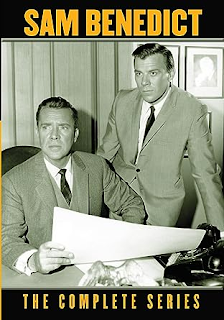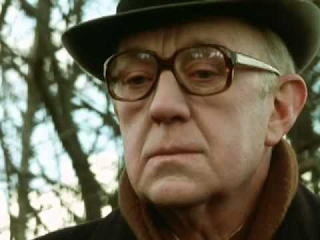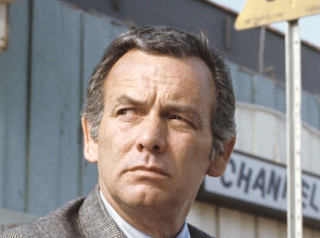Shows I’ve Watched: | Shows I've Added: |
Sam Benedict | Captains and the Kings |
Harry O Tinker, Tailor, Soldier, Spy Smiley's People Burke's Law | Twin Peaks: The Return |
True story: in 1963, the family of Dallas nightclub owner Jack Ruby was looking for a lawyer to represent him. Jack, you see, had gotten himself in a bit of trouble: he'd just murdered Lee Harvey Oswald, the alleged assassin of John F. Kennedy, in front of millions of stunned viewers on television, and now he was in jail. The family had already approached high-powered Texas attorney Percy Foreman, "The biggest, brashest, brightest criminal lawyer in America," but he'd turned down the case.
And then a strange player became involved in the discussion. NBC—ironically, the only network to actually air the Oswald murder live—encouraged Jake Ehrlich, one of the nation's best-known defense attorneys (his clientele included Errol Flynn, Billie Holiday, Howard Hughes and poet Lawrence Ferlinghetti) to take the case. The family ultimately chose another celebrity attorney, Melvin Belli, supposedly because "they didn’t want to bring a Jewish lawyer into the case to defend this Jewish defendant" in Texas. But why did the network get involved in the first place? As it happened, NBC had a relationship with Ehrlich, going back to a weekly one-hour legal drama whose main character was based on him. That series was Sam Benedict.
I'm not quite sure what NBC had to gain from this move, considering they'd cancelled Sam Benedict earlier that year, after one season of 28 episodes. Of course, the publicity for the network would have been massive had the show still been on—"Based on the life of Jack Ruby's lawyer!"—but, unless they were hoping to bring the series back, they don't seem to have had much to gain from the whole thing. Maybe they were just trying to do a friend a favor.
If the idea was, in fact, to create interest in bringing back the series, it's too bad the ploy didn't pan out, because Sam Benedict is an excellent series, one not afraid to tackle difficult issues, and, I suspect, one that's slightly more realistic when it comes to life as a big-time lawyer than, say, Perry Mason. (Ehrlich was also rumored to be the model for Mason, but Erle Stanley Gardner always denied it.)
If George Smiley had somehow been American, an agent of the CIA rather than MI-6, one might have imagined David Janssen in the role, and you could certainly have done worse than that. Cynical, disenchanted, world-weary, but determined nonetheless to finish the job: that would have been Janssen as Smiley, just as it is Janssen as Harry Orwell, the irascible private detective of Harry O, which ran on ABC for 44 episodes between 1974 and 1976.
The star of Sam Benedict is the excellent Edmund O'Brien, an actor with succes both in movies (he won a Best Supporting Oscar in 1954 for The Barefoot Contessa, was nominated for a second Oscar in 1964 for Seven Days in May, and starred in one of the most famous of noir movies, D.O.A. in 1950) and on television (many guest appearance, and a starring role in the 1959-60 detective series Johnny Midnight). O'Brien plays Benedict at full-throttle, tossing off one-word answers to phone messages, dictating letters, appearing in court, and defending a featured client each week. He can be brusque, gruff, impatient, and downright rude; he is also eloquent, intuitive, compassionate, and. once on board, totally dedicated to justice for his client. (One biography written about him was called Never Plead Guilty.) In other words, he's precisely the kind of lawyer you'd want representing you.
Sam's assisted in his efforts by his loyal and efficient secretary, Trudy (Joan Tompkins), and Hank Tabor (Richard Rust), a young lawyer who, in the first episode, convinces Sam to take him on as an assistant and mentor him in the art of trial law. The relationship between Sam and Hank is a natural one; Hank is a bit wet behind the ears, but he's sharp and eager to learn, and Sam sees something of himself in the young man. The arrangement works out nicely in dramatic terms as well; while the two sometimes collaborate on a single case, they usually work separately, with Sam taking on the main case while Hank is involved in the secondary story. (As the young lawyer gains experience, he occasionally becomes the featured character.)
Sam Benedict, like most legal dramas, is occasionally given to speechifying (Ehrlich himself was known as an impassioned and eloquent speaker and writer, authoring a dozen books on the law). Nonetheless, the show more than makes up for it with solid directing and writing that is always very good and occasionally excellent. Sam's clientele is a rich mixture of the wealthy and the unfortunate, complex individuals rather than the the broad and often irritating eccentrics seen too frequently in Perry Mason, and they're well-served by an outstanding lineup of guest stars, including Claude Raines (who gave a sensitive performance as Sam's own mentor, now an old man whose life is crumbling following the death of his daughter), Joseph Schildkraut (a wise and shrewd old rabbi), Diana Hyland (an old flame of Hank's who may be trying to escape her past), Gloria Grahame (in a whimsical secondary role) and more.
I'm sorry Sam Benedict didn't get more than a one-season tryout. Like Judd, for the Defense, it's a show with a harder edge and less formulaic than the always-enjoyable Mason, and a reminder that the law can be a noble and honorable profession, and that justice, now more than ever, is an elusive quality that should be cherished rather than scorned or trodden upon.
l l l
When Alec Guinness took on the role of John le Carré's famous Cold War spy George Smiley in 1979's Tinker, Tailor, Soldier, Spy and its 1982 sequel, Smiley's People, it was as if, after the success of Star Wars, he'd decided to remind everyone that the old man could still act. Sure, he'd been nominated for an Oscar for Star Wars, but he'd also referred to it as "fairy-tale rubbish," and said that he "shrivelled up" every time the movie was mentioned to him. No such concerns with le Carré, though, and Guinness's dominant performances in the two miniseries raise them far above what we usually see in the standard spy story.
You might recall George Smiley as a supporting, though consequential, character in the 1965 movie The Spy Who Came in from the Cold, obscured by the overpowering performance of Richard Burton in the title role, and he occupies similar smaller roles in several other le Carré novels. He's the central figure in several others, though, including Tinker, Tailor, Soldier, Spy, a co-production of the BBC and Paramount (one gets the idea that it might have been just a bit too good for Masterpiece Theatre, not to mention too expensive).
It's a new era for British intelligence (referred to colloquially as the Circus), and after a series of disasters, the dusty old guard has been swept out in favor of a new, more streamlined and progressive leadership. Smiley was part of that old guard, but after being retired to pasture, he's now been called back on the QT: compelling evidence has come to light that a Soviet mole has penetrated the highest ranks of the Circus.
Smiley's assignment is to identify the mole from a quartet of suspects, code-named Tinker, Tailor, Soldier, and Spy (Sailor being deemed too smiliar in sound to Tailor). Along the way, his investigation—aided by a small number of trusted agents who owe their livelihoods to Smiley, as well as those who, like George, were seen as obsolete by the new regime—digs up skeletons both figurative and literal, on the way to finding out some uncomfortable truths about the Circus and those who run it.
Smiley's People, set a few years later, once again finds Smiley called out of retirement to investigate a case, this time involving an old Russian, one of Smiley's contacts from the past, who was murdered trying to get vital information to Smiley. Unlike Tinker, Tailor, which allowed much of its story to unfold via flashbacks not involving Smiley, Smiley's People tells a story which is more linear, with Smiley as the propellant moving the investigation forward.
Le Carré's stories are shrouded in a bleak, ambiguous landscape of suspicion and betrayal, one that assumes a kind of moral equivalence between East and West, in tactics if not in ideology. Smiley has come to a cynical acceptance of way things are; he has every reason, considering the way he was put to pasture, to tell them all to go to hell, but despite the indifference and politicalization—and naivety—of the men running the Circus, he believes there's still a job to do, and someone has to take responsibility for doing it.
The casts for both series are uniformely good: Michael Jayston, Bernard Hepton, Ian Richardson, and Hywel Bennett in Tinker, Taylor and Hepton, Patrick Stewart, Michael Byrne, and Curd Jürgens. However, it is unquestionably Guinness, who superbly inhabits le Carré's's "breathtakingly ordinary" spymaster, moving forward despite any inner conflicts, who provides the moral center of the stories; while they tend to drag at times (especially the more obtuse Smiley's People), the screen crackles every time Guinness appears. Le Carré himself was so impressed with Guinness's work that he began to tailor his descriptions of Smiley in future books to more resemble Guinness's performance.
I've used the word cynical to describe le Carré's work, and that applies to the spy business as well. It is both ironic and disturbing, this business in which the "good" guys constantly adopt the tactics of the "bad" guys in an effort to defeat them. To what end, one is prompted to wonder.
l l l
The premise for Harry O provides something of a variation on the typical private eye series: Orwell, a former police detective forced to retire after taking a bullet in the back, runs a low-budget agency out of his San Diego beach house. He's a loner, forever seen working on restoring his boat, and were it not for his female next-door neighbors taking care of him, it's doubtful he'd pay much attention to anything around him. His car is often in the repair shop, with the result that he's usually found taking the bus to appointments. Much like Sam Benedict, he can be rude and abrasive even with his clients, but unless you're the target of his investigation, his bark is usually worse than his bite.
Janssen's charisma, along with a typical PI-style voiceover that combines wryness and self-awareness in an elegant mix, works with the show's serious, often downbeat tone to provide a detective story that's refreshingly different. Ah, if only ABC had left their hands off of it. In an effort to boost ratings, the locale is changed from San Diego to Los Angeles, more action and gunplay is added, and he's given a proto-girlfriend in Farrah Fawcett-Majors. Still, these changes improved the ratings, and had it not been for Fred Silverman and his thirst for jiggle TV, it might have continued. But, alas, Harry O was out and Charlie's Angels (complete with Farrah) was in.
I prefer the earlier episodes, as I think most fans do, but after the success of his previous Richard Diamond, it's just a kick seeing Janssen in private detective-mode again. It's a comfortable Thursday-night fit in the schedule, following Hawaii Five-O, N.Y.P.D., Felony Squad, Johnny Staccato, The Lineup, and—yes—Richard Diamond. And then there's Burke's Law to round things out—but I just finished telling you about that. TV







Mitchell, where did you find, "Captains and the Kings?" I've been looking for that for a while.
ReplyDeleteI found it at Half Price Books - it was commercially issued a few years ago, but the price they're asking at Amazon is, well, all I say say is that I got it for a lot less than that!
Delete